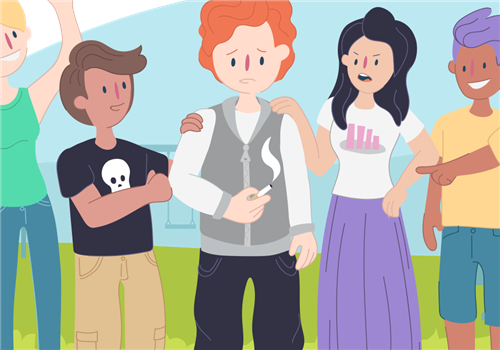Advisement & Counseling
Page Navigation
- Overview
- Mission and Goals
- Elementary School Comprehensive Counseling Program
- Middle School Comprehensive Counseling Program
- Middle School Advisement Guide
- High School Comprehensive Counseling Program
- Dual Enrollment
- Test Prep Information
- College and Career Support
- GEORGIA MATCH
- HOPE Scholarship Information
- Henry Futures
- Financial Aid and Scholarships
- Internships/Summer Programs/Leadership Programs
- Lack of Supervision Guidelines
- School Counseling Internship & Practicum Information
- Resources for Undocumented Youth
- Preventing Youth Suicide: Tips for Parents and Educators
- Student Wellness: Tips and Strategies
- How to Handle Peer Pressure
- REACH GA Scholarship Program (8th Grade Start Year)
-
How to Handle Peer Pressure

Learn strategies that can help you handle negative peer pressure.
What is peer pressure?
Everyone has peers. Peers can be your friends who are about your age and have similar interests and experiences. Peers can also be other kids who are about your age and are involved in the same activities with you or are part of a community or group you belong to. You may not consider all of your peers to be friends, but they can all influence you.
Peer pressure can be positive or negative. When peer pressure is positive, it pushes you to be your best. Negative peer pressure is when someone who is a friend or part of a group you belong to makes you feel that you have to do something to be accepted. It’s the negative peer pressure that we usually think of when the phrase peer pressure is used. When you give in to negative peer pressure, you often feel guilty or disappointed with yourself for acting in a way that goes against your beliefs or values.
Some examples of negative peer pressure are:
- Needing to dress or act a certain way.
- Cheating or copying someone else’s work or letting others copy your work.
- Not including certain people in social activities.
- Taking dangerous risks when driving.
- Using drugs or alcohol.
- Shoplifting or stealing.
- Engaging in sexual activity.
- Engaging in bullying or cyberbullying.
- Projecting a misleading/false image on social media.
What strategies can help handle negative peer pressure?
- Pay attention to how you feel. If something doesn’t feel right about a situation, it probably isn’t. Even if your friends seem ok with what is going on, the situation may not be right for you.
- Plan ahead. Think about how you will respond in different situations. Plan what you can say or what you can do.
- Talk to the person who is pressuring, let him or her know how it makes you feel and tell the person stop.
- Have a secret code to communicate with parents. Something you can say or text to your parent(s) that lets them know you need out of a situation. Parents can either call or text to say that you need to come home, or that they need to pick you up.
- Give an excuse. It should be ok to say “no” without needing to apologize or give an explanation. But it may make it easier to say no if you have a ready reason. Perhaps saying you have a medical reason such as asthma or allergies that makes it dangerous for you to take anything. Or even stating that your parents need you to come home, if you feel it would be best to leave the situation all together.
- Have friends with similar values and beliefs. It is easier to say “no” if someone else is also saying it. Saying “no” together makes it easier for the both of you.
- Get support from a trusted adult such as a parent, teacher, or school counselor. A trusted adult can listen to you and help you with strategies that might work in your situation.
Resources


